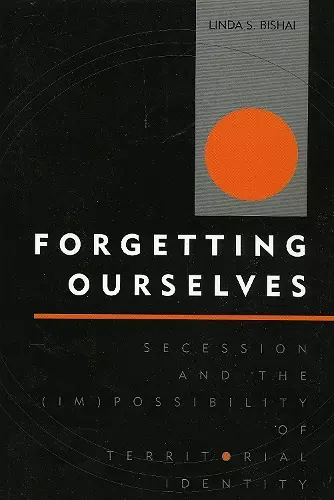Forgetting Ourselves
Secession and the (Im)possibility of Territorial Identity
Format:Paperback
Publisher:Bloomsbury Publishing PLC
Published:5th Dec '06
Currently unavailable, and unfortunately no date known when it will be back

Secession is one of the richest veins yet to be mined in international relations. The unexplored concept of secession implicates a host of historical accomplices related to the development of industrial modernity and considerable changes in the nature of sovereignty and the state. By historicizing secession it becomes possible not only to explain the historical transformations that have led to the theoretical impasse on secession but to better articulate the possibilities for current transformative interactions. In Forgetting Ourselves, Linda Bishai thoroughly examines why secession has been ignored by international relations both in theory and practice. Mainstream perspectives in international relations theory have, up to this point, questioned neither state formation nor the inside/outside divide of state sovereignty. Bishai, however, historicizes and questions the concept of secession itself, and the component assumptions of territoriality and identity upon which it rests. Forgetting Ourselves places secession in its proper historical context as something possible only in the modern era and only perceived as a global threat within the last century. Bishai argues that understanding the historic contingency of secessionist conflict allows us to contemplate an alternative vision of international relations in which the violence associated with controlling territory is no longer necessary for validating political identities.
This is a tightly argued and clearly written work engaging both major currents of thought about state territoriality and sovereignty and empirical materials on a selection of contemporary secessionist movements from around the world. Two features are outstanding: the contribution made to understanding the connection between territory and political identity, and the original analysis, of secessionist movements in terms of the 'performance' of territory/identity claims. -- John Agnew, UCLA; author of Place and Politics in Modern Italy
This work will best be appreciated by those conversant in liberal and postmodern political theory from John Rawles to Charles Taylor, Will Kymlicka, William Connolly, and those supportive of a constitutive or constructivist IR theoretical approach. Recommended. * Choice Reviews *
Bishai offers an impressive critique of the fantasy of timelessness and indivisibility that befell the understanding of territorial statehood, especially in the discipline of international relations. Through an acute historical and philosophical analysis of the secession phenomenon, she issues an important and timely challenge: to forget 'oneself' in order to make possible 'other selves', to enable a politics of identity which can accommodate overlapping loyalties, a politics not embedded in unreflective homogenization, nation-building and territoriality schemes. -- Costas Constantinou, Keele University, International Relations
Drawing on Nietzschean insights, Bishai demonstrates the historical newness and philosophical impossibility of secession, and devastates extant ethical and causal scholarship on the issue. Students of IR are forced to pay long overdue interest to a topic that should have been central to the discipline all along. -- Iver Neumann, Norwegian Institute of International Affairs
ISBN: 9780739120828
Dimensions: 232mm x 156mm x 15mm
Weight: 295g
190 pages